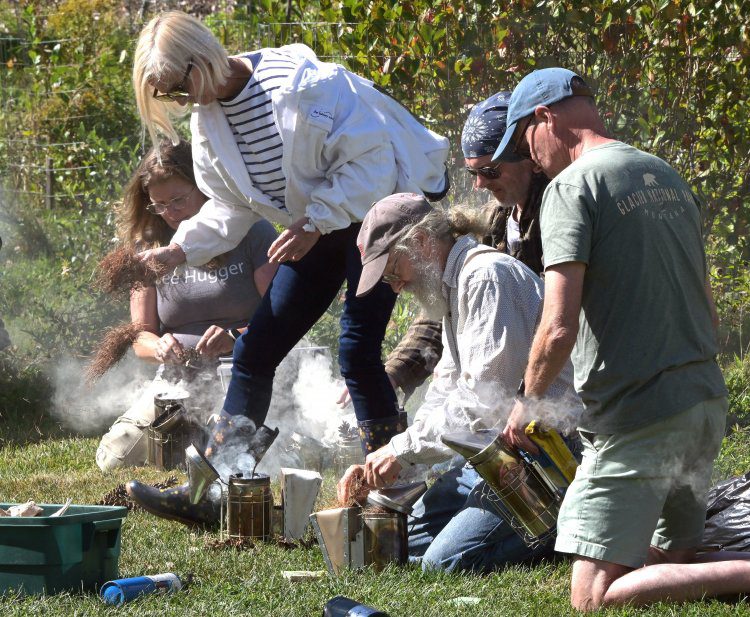

Don McLean of Norway, Maine, kneeling in center, uses pine needles, a pine cone and newspaper while showing how to light a smoker and keep it burning, during the Maine State Beekeepers Association Bee Fest at Viles Arboretum at 153 Hospital St. in Augusta. Rich Abrahamson/Morning Sentinel
AUGUSTA — The first Maine State Beekeepers Association Bee Fest had Viles Arboretum buzzing Sunday about the world’s smartest insect, including how bees communicate.
Workshops throughout the day taught tips for beekeepers and would-be beekeepers, including how to prevent mites from decimating hives, and ways to determine — by looking at your beehive — what bees need to thrive and produce honey.
Thomas Seeley, a bee researcher and author of several books on the insect, shared his understanding of five bee behaviors — some discovered by his own research — that individual bees display for the benefit of the superorganism of their hive or colony, rather than themselves.
“Honeybees are the brainiest of all insects on the planet. Their communication skills are amazing,” Seeley told a couple of hundred people who had gathered under a large tent at the arboretum at 153 Hospital St. in Augusta. “These are very smart critters.”


Western honeybees emerge from a hive Sunday during the Maine State Beekeepers Association Bee Fest at Viles Arboretum at 153 Hospital St. in Augusta. Rich Abrahamson/Morning Sentinel
Viles Arboretum donated use of its facilities for the first Maine State Beekeepers Association Bee Fest.
Seeley’s five bee behaviors, some of which were mysteries that he unraveled through his research, are:
• How bees give directions to the rest of their colony to important places such as flowers full of nectar.
• How bees ask other bees for help unloading the nectar they have collected.
• How bees wake other bees from sleep to help with work.
• How bees ask for help grooming parts of their body and removing pollen they cannot reach themselves.
• How bees know when their hive needs water to keep it cool.
He said bees communicate in several ways, including dancing. This includes a detailed waggle dance, performed in the hive to show other bees the flight path they should follow to find flowers full of nectar.


A frame holding honeybees is raised Sunday during the Maine State Beekeepers Association Bee Fest at Viles Arboretum at 153 Hospital St. in Augusta. Rich Abrahamson/Morning Sentinel
Seeley said bees reenact their flights to especially rich food sources, simulating the angle and speed of their wings and the lengths of their flights, so other bees will know the route to the resources for the benefit of the entire colony. The dance, he said, makes bees the only living creature on the planet — other than humans — that can give others directions.
The more times the bee repeats the dance, Seeley said, the better the food source is, though that can depend on individual bees, because some dance longer and more vigorously than others.
“Worker bees have distinct personalities. Some are more peppy than others,” Seeley said. “If you’re a teacher, this doesn’t surprise you. Just like us, bees are individuals.”
Erin Evans, a beekeeper from Portland, showed attendees inside an apiary at Viles Arboretum how to determine the health of a hive, and what the bees living in it might need. Thousands of bees flew around Evans and her spectators as she taught, though teacher and students seemed unconcerned about the bees buzzing around them.
Evans said the wooden hive she opened looked “beautiful,” with plenty of honey and eggs in place, indicating a queen was inside. The hive was in good shape with winter looming.
Evans described the hive as a superorganism, with individual bees working for the benefit of the collective.
“If this were a human being, this would be a supermodel,” she said of the hive, which had honeybees climbing on its surface, hundreds more inside and hundreds flying around it.
Evans explained that the adult bees inside the hive Sunday would be dead within 45 days, with the eggs and baby bees in the hive to take their place by winter.
Elizabeth Downs, 12, of Eddington demonstrated how to perform mite rolls, a method of checking to see if hives have been infiltrated by mites. The method, she explained, kills the bees you use to test for mites, but is, again, for the greater good of the hive. If the test reveals three or more mites, she said, hives need to be treated to ensure their survival.


Winnie Grote, 3, and her mother, Arla Casselman, of Warren explore during the Maine State Beekeepers Association Bee Fest at Viles Arboretum at 153 Hospital St. in Augusta. Rich Abrahamson/Morning Sentinel
Downs demonstrated with about a half-cup of bees — about 300 insects — she had brought from home in a Mason jar. She squirted alcohol into the jar and shook it vigorously, which kills the bees, but reveals mites hiding among them. The 300 bees, she said, are a small percentage of a hive’s population.
“It’s really important to check for mites, because it can lead to a lot of other problems,” said Downs, who has five hives at home and has been beekeeping since she was 6 years old. “It kills them, but killing 300 bees is better than losing your whole hive.”
Admission to the first Maine State Beekeepers Association Bee Fest was free, and included vendors selling products for beekeepers, honey tasting and a hive smoker contest.
Copy the Story Link
Source link : http://www.bing.com/news/apiclick.aspx?ref=FexRss&aid=&tid=66de3410b3af48348e73e62dd111afdb&url=https%3A%2F%2Fwww.centralmaine.com%2F2024%2F09%2F08%2Faugusta-abuzz-with-first-maine-state-beekeepers-association-bee-fest%2F&c=17289955168820048319&mkt=en-us
Author :
Publish date : 2024-09-08 11:50:00
Copyright for syndicated content belongs to the linked Source.